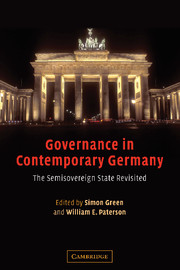Book contents
- Frontmatter
- Contents
- List of figures
- List of tables
- List of contributors
- Acknowledgments
- List of abbreviations
- 1 Introduction: Semisovereignty Challenged
- 2 Institutional Transfer: Can Semisovereignty be Transferred? The Political Economy of Eastern Germany
- 3 Political Parties
- 4 Federalism: the New Territorialism
- 5 Shock-Absorbers Under Stress: Parapublic Institutions and the Double Challenges of German Unification and European Integration
- 6 Economic Policy Management: Catastrophic Equilibrium, Tipping Points and Crisis Interventions
- 7 Industrial Relations: From State Weakness as Strength to State Weakness as Weakness. Welfare Corporatism and the Private Use of the Public Interest
- 8 Social Policy: Crisis and Transformation
- 9 Immigration and Integration Policy: Between Incrementalism and Non-decisions
- 10 Environmental Policy: the Law of Diminishing Returns?
- 11 Administrative Reform: Is Public Bureaucracy Still an Obstacle?
- 12 European Policy-making: Between Associated Sovereignty and Semisovereignty
- 13 Conclusion: Semisovereignty in United Germany
- References
- Index
7 - Industrial Relations: From State Weakness as Strength to State Weakness as Weakness. Welfare Corporatism and the Private Use of the Public Interest
Published online by Cambridge University Press: 05 June 2012
- Frontmatter
- Contents
- List of figures
- List of tables
- List of contributors
- Acknowledgments
- List of abbreviations
- 1 Introduction: Semisovereignty Challenged
- 2 Institutional Transfer: Can Semisovereignty be Transferred? The Political Economy of Eastern Germany
- 3 Political Parties
- 4 Federalism: the New Territorialism
- 5 Shock-Absorbers Under Stress: Parapublic Institutions and the Double Challenges of German Unification and European Integration
- 6 Economic Policy Management: Catastrophic Equilibrium, Tipping Points and Crisis Interventions
- 7 Industrial Relations: From State Weakness as Strength to State Weakness as Weakness. Welfare Corporatism and the Private Use of the Public Interest
- 8 Social Policy: Crisis and Transformation
- 9 Immigration and Integration Policy: Between Incrementalism and Non-decisions
- 10 Environmental Policy: the Law of Diminishing Returns?
- 11 Administrative Reform: Is Public Bureaucracy Still an Obstacle?
- 12 European Policy-making: Between Associated Sovereignty and Semisovereignty
- 13 Conclusion: Semisovereignty in United Germany
- References
- Index
Summary
Can being governed by a state that is not fully sovereign be anything other than a crippling disadvantage for a country? In his seminal analysis of post-war West Germany, Peter Katzenstein suggests it can. Indeed he argues that precisely not having command of full state capacities afforded West Germany more effective governance than comparable countries. This was because semisovereignty, according to Katzenstein, protected the West German state from counterproductive illusions of omnipotence other states at the time still held, and forced it to cultivate means of public policy other than direct state control – means much better matched than traditional state intervention to the evolving problems of governance in a changing world.
Successful semisovereign governance, in Katzenstein's sense, rests on two pillars. First, a fragmented, decentralised state whose capacities for direct intervention are limited must learn to make deals with independent actors in civil society which command their own sort of sovereignty which cannot be ignored or circumvented. A state of this sort must, therefore, be a ‘co-operative state’ (Wilke 1983), one that governs more by negotiation and co-optation than by legal command (Scharpf 1993). Where this works – in a political system that has learned to build a culture and develop techniques of indirect control – independent social organisations and institutions with their guaranteed autonomy and power turn into agents of publicly licensed self-government, under the roof of a negotiated public order of which the state is just one element among others, although a pivotal one (Streeck and Schmitter 1984).
- Type
- Chapter
- Information
- Governance in Contemporary GermanyThe Semisovereign State Revisited, pp. 138 - 164Publisher: Cambridge University PressPrint publication year: 2005
- 19
- Cited by

